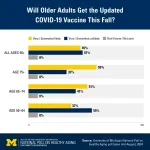(Press-News.org) A new preclinical model using CRISPR, an advanced technology that allows scientists to cut and edit genes, has given Weill Cornell Medicine researchers and their colleagues a deeper insight into how prostate cancer spreads or metastasizes.
In the study, published Sept. 23 in Cancer Discovery, scientists charted the complicated routes prostate cancer metastatic cells take as they travel through the body.
“Using virtual maps, we can reveal the hidden highways of metastases, one day guiding us towards novel therapies that could act as roadblocks for cancer,” said study senior author Dr. Dawid Nowak, assistant professor of pharmacology in medicine and the Walter B. Wriston Research Scholar in Medicine at Weill Cornell Medicine.
The Impact of Prostate Cancer Metastases
Approximately 12% of men receive a prostate cancer diagnosis in their lifetime. The American Cancer Society predicts about 35,250 deaths from the disease will occur in 2024 in the United States.
“Prostate cancer that spreads to the lungs, liver and bones has the most impact on survival,” said lead study author Dr. Ryan Serio, a postdoctoral associate in medicine at Weill Cornell Medicine. When prostate cancer is confined to the primary tumor, survival is nearly 100%. When the cancer spreads, or metastasizes, the patient’s chance of survival drops to less than 40%.
A better understanding of prostate cancer metastasis opens possibilities for better treatments, said Dr. Nowak, who is also an assistant professor in the Tri-Institutional PhD Program in Computational Biology and Medicine and a member of the Sandra and Edward Meyer Cancer Center at Weill Cornell Medicine.
An Innovative Model
To study the development and spread of prostate cancer, the research team developed a new mouse model called EvoCaP. In addition to Drs. Nowak and Serio, Dr. Christopher Barbieri, associate professor of urology at Weill Cornell Medicine, and Drs. Adam Siepel and Armin Scheben, computational biologists at Cold Spring Harbor Laboratory, contributed to the project.
The investigators injected 12-week-old mice with a virus designed to carry genetic information to the prostate. The virus contained instructions to delete two tumor suppressor genes, thereby encouraging the growth and spread of prostate cancer, and introduce a “barcode,” or a unique genetic marker that could then be edited with CRISPR technology.
Combined with tools such as genetic sequencing and bioluminescence imaging, this barcode allowed researchers to track the origins and movements of prostate cancer clones—cells that arise from the original cancer cell that share the same genetic mutations and that grow, multiply and spread. They tracked the clones until the mice were up to 60-weeks old.
“With barcoding, we were able to follow clonal cells as they spread to different metastatic sites throughout the body,” Dr. Serio said. The researchers were able to pinpoint the clonal cells responsible for cancer spread and the patterns in which they spread. For example, they observed that while the primary tumor contained many prostate cancer cells, most metastases began with a small number of aggressive clones moving out of the tumor and into the bones, liver, lungs and lymph nodes.
They also observed that once most cancer cells spread to an organ, they were likely to stay there rather than spread to another area, with just a few closely related cells instigating additional spread. “These patterns of spread, or seeding topologies, in mice reflect what has also been observed in humans”, Dr. Serio said.
“We were very intrigued to find that the routes of metastasis from our models matched to some extent human cancer seeding so well,” Dr. Nowak said. “Using our techniques to map the metastatic cell trajectories gives us a great start in getting to the bottom of how this deadly cancer spreads.”
Many Weill Cornell Medicine physicians and scientists maintain relationships and collaborate with external organizations to foster scientific innovation and provide expert guidance. The institution makes these disclosures public to ensure transparency. For this information, see profile for Dr. Dawid Nowak.
The research described in this story was supported in part by the National Cancer Institute and the National Institute of General Medical Sciences, both part of the National Institutes of Health, through grant numbers R01CA272466 and R35GM127070.
END
The National Institutes of Health (NIH) is awarding $5.4 million in first-year funding to establish a new program that supports the integration of genomics into learning health systems.
Present in many hospitals across the United States, learning health systems are a type of clinical practice that bridges research and patient care. These systems use a variety of methods to continually analyze patient data. Clinicians then use the results of those analyses to refine practices and improve future care.
The new Genomics-enabled Learning Health System (gLHS) Network aims ...
When given the choice, people prefer to collaborate on work projects with higher-paid colleagues, but they want to hire subordinates with a lower pay history than theirs, according to research published by the American Psychological Association.
The research, published in the journal American Psychologist, aimed to explore how a trend toward increasing pay transparency in the business world may affect workers’ behavior.
“I've long been interested in the ways in which slight -- and not-so-slight -- differences in salaries can generate strong ...
Since the 1970s, coral reefs in the Florida Keys National Marine Sanctuary (FKNMS) have experienced catastrophic declines in coral cover, with as much as a 50% reduction between 1998 and 2011 alone. Although coral reefs within the FKNMS have been heavily studied, research in the mesophotic zone, which extends from about 100 to 500 feet deep, has historically been more limited in this region.
Mesophotic coral ecosystems have the potential to be buffered from anthropogenic stressors due to their depth and/or relative isolation from ...
COLUMBUS, Ohio – Americans who say they expect to “never retire” are more likely than others to score low on a measure of financial knowledge, a new study shows.
In a national survey, 20% of those who missed all three financial knowledge questions said they expected they would never retire, compared to 12% who answered all questions correctly, who said they’d likely work well past retirement age.
The study also found that those who were overconfident in their financial knowledge (and those whose low levels of confidence ...
A new peer-reviewed study published in PeerJ Life and Environment has uncovered alarming levels of seafood mislabeling and the use of ambiguous market names in Calgary's seafood market, often concealing species of conservation concern. This research marks the first Canadian study to investigate both invertebrate and finfish mislabeling and the implications of unclear market names.
The study, titled "Mislabeled and Ambiguous Market Names in Invertebrate and Finfish Seafood Conceal Species of Conservation ...
The newly updated COVID-19 vaccine just arrived in pharmacies and clinics nationwide, and a new poll suggests nearly half of people age 50 and older plan to get it. But some older adults with high risk of severe illness appear unlikely to seek the vaccine, and interest varies widely by age group, education level, race and ethnicity, and other factors, the poll shows.
In all, 45% of people age 50 and older say they’re likely to get the updated vaccine, according to the new findings from the University of Michigan’s National Poll on Healthy Aging. The data come from polling done in August 2024, just before the new vaccine was released but ...
Nearly three-quarters of Dutch elite athletes and forty percent of their coaches report sport-related distress. This is one of the findings from a study conducted by Amsterdam UMC together with NOC*NSF, the organisation which represents the Dutch Olympic Committee and the Dutch Sport Federation, published today in BMJ Open Sport & Exercise Medicine.
The most common mental health problem among athletes and coaches is report sport-related distress (73% and 41%, respectively). Unfavorable alcohol consumption that can negatively affect sports performance is also common (52% and 53%). In athletes, ...
New York City (Sep 24, 2024) – Researchers at the Icahn School of Medicine at Mount Sinai have published a pivotal study in Nature Genetics (DOI: 10.1038/s41588-024-01917-1) that sheds light on a novel genetic variant associated with intellectual capacities and educational outcomes. This discovery offers new insights into intellectual disability diagnostics and potential therapeutic avenues.
The study reveals the significant impact of tandem repeats—sequences of DNA where a pattern of nucleotides is repeated multiple times in a head-to-tail manner on a chromosome—on intellectual functioning.
"The ...
Older people are more likely to be influenced by the impulsive financial preferences of others than their younger counterparts, according to a new study.
Research lead by psychologists at the University of Birmingham and the University of Oxford published today in Communications Psychology, reveals that people aged 60 and over are more prone to being influenced by other people when it comes to making impulsive financial decisions compared to young adults aged between 18 -36.
The study set out to explore delayed gratification and how our willingness to wait and social influence develop and differ across our lifespan. To test how age ...
Top ocean experts have published a report that redefines the concept of “sustainable fishing” and proposes 11 “golden rules” that radically challenge the flawed approach that currently prevails in fisheries management.
Published a week before Brussels’ Ocean Week, and a few months before the UN Ocean Conference in Nice, the rules have been devised to put an end to the ongoing destruction of the oceans caused by fishing, and ensure the renewal of abundant fish populations to feed future generations.
They come at a time when scientists have drastically downgraded their assessment of the ocean’s health status.
The rules ...




